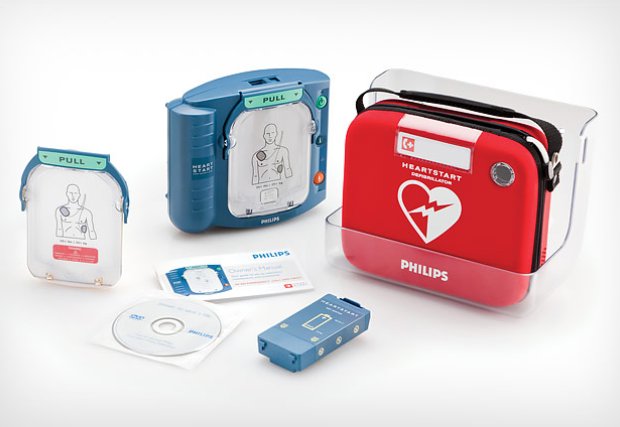In collaboration with Aiken Regional Medical Centers, the Aiken Rotary Clubs have begun placing automatic external defibrillators (AEDs) in Aiken public facilities. The portable devices can help in an emergency when people have a suspected cardiac arrest.
John Lindsay, Vice President of the Rotary Club, and project chairperson for the campaign, says the organization is grateful to Aiken Regional for contributing toward the purchase of 12 AEDs to place in local educational and government buildings. Aiken Electric Cooperative also provided sponsorship. “Our own District Governor Lance Young survived a heart attack at age 39 because of an AED,” says John. “He was thankful his life was saved through use of an AED, and he wanted to help others.”
Cardiologist Weems Pennington, MD, says he understands and stresses the importance of having AEDs in the community. “They are portable and you don’t have to have a medical background to use them,” says Dr. Pennington. He explains one of his patients decided to buy one for his business, and within a week, his own employees saved him with it. “You never know when you will need it.”
Dr. Pennington states that if someone goes into cardiac arrest, an AED detects if there is an abnormal rhythm and sends a shock to normalize the heart. ”CPR helps keep blood flowing through the body until medics arrive, which is crucial,” he says.
Vance Reynolds, Chief Executive Officer of Aiken Regional Medical Centers, says the hospital will provide training for the new devices. “The AEDs come with step-by-step directions, and you just follow the prompts. It’s very simple,” says Vance.
What is Cardiac Arrest?
Cardiac arrest occurs when there is a malfunction in the electrical system of the heart that causes the heart’s pumping action to be disrupted. This is called an arrhythmia. As a result, the brain and other organs do not receive blood.
Shortly after this occurs, the person may collapse, become unresponsive or stop breathing. If treatment is not given immediately, the person can die or sustain permanent brain damage. Sometimes, people may experience symptoms similar to a heart attack, but there is usually no warning with sudden cardiac arrest.
The American Heart Association recommends the following if cardiac arrest is suspected:
- Call 9-1-1 immediately.
- Begin CPR. While waiting for help to arrive, start CPR. Push hard and fast on the person’s chest, at least 100 pushes per minute, until help arrives.
- Use an AED. If an AED is nearby, follow the prompts dictated by the machine. The 9-1-1 operator may also be able to assist you. The AED will automatically check for the heart’s rhythm and send a shock if none is detected. Further prompts will be given by the machine as necessary.
CPR and AEDs can save lives! Register for Aiken Regional first aid and CPR training courses.

